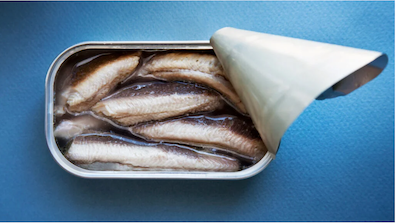"The Study in Aesthetics" was published in Lustra in
1916, a little more than two years after Pound started helping
Joyce get his works into print. To my
knowledge no other annotator or critic has yet detected an
echo of this poem in Joyce's fiction, but it sets a scene that
strikingly anticipates Molly's thoughts:
The very small children in patched clothing,
Being smitten with an unusual wisdom,
Stopped in their play as she passed them
And cried up from their cobbles:
Guarda!
Ahi, guarda! ch’ è be'a!
But three years after this
I heard the young Dante, whose last name I do
not
know—
For there are, in Sirmione, twenty-eight young Dantes
and thirty-four Catulli;
And there had been a great catch of sardines,
And his elders
Were packing them in the great wooden boxes
For the market in Brescia, and he
Leapt about, snatching at the bright fish
And getting in both of their ways;
And in vain they commanded him to sta fermo!
And when they would not let him arrange
The fish in the boxes
He stroked those which were already arranged,
Murmuring for his own satisfaction
This identical phrase:
Ch’ è be'a.
And at this I was mildly abashed.
The children's cry of "Look! Ah, look! How beautiful!" comes in
response to a woman walking along a cobbled Italian street––some
dignified English or American lady, no doubt, and certainly
dressed in something much finer than "patched clothing," because
the speaker of the poem approves of the raggamuffins' "unusual
wisdom" in admiring her. But then, three years later, this
appreciator of civilized deportment is astonished, and "mildly
abashed," to hear the same worship uttered in response to a
crate of dead fish. The inference to be drawn from his aesthetic
study is that the things of nature––unimproved by artifice,
already perfect––contain a beauty as deep as anything fashioned
by the hand of man.
Having lived in Trieste from 1904 to 1915, Joyce would have
readily responded to the poem's rich sensory evocation of
fishermen working on the docks, and he may well be winking at
such memories by having Molly recall, not Spaniards or Catalans
on the Gibraltar docks, but "
old Luigi near a hundred they
said came from Genoa." Other echoes of the poem, if indeed
they are such, become similarly altered to suit Joyce's purposes
in
Penelope. Instead of a third-person narrator looking
at elegant female finery and crates of fish, Molly herself
remembers how her expensive clothes (white shoes, a fancy and
delicate hat) were ruined by wind, spray, and waves as the
rowboat pitched about, and she contrasts that unpleasantness
with her happy childhood memory of sardines. The transition is
effected by means of a conjunction, "
because." Perhaps
this connective records a logical choice that Molly made at Bray
(the only reason I agreed to join him on his mad adventure was
that "
the smell of the sea excited me," bringing back
those memories of the Gibraltar docks), or perhaps it simply
signals her passage from annoyance to wonder (it was good to
remember that maritime excitement, even if it cost me some nice
clothes).
Pound sets up a contrast between the finely dressed woman and
the fish. The boy's
"Ch' è be'a!" corrects the blinkered
aesthetics of the speaker, leaving him embarrassed. Joyce
rearranges the narrative elements of his model by having the
finely dressed woman remember how
she admired the fish
as
a child, and he has a clear purpose in doing so. Just as Pound
wants to suggest the limitations of his speaker, Joyce wants to
suggest the limitations of all the men in his novel. The joy
that young Marion took in the fish––"
they were fine all
silver in the fishermens baskets"––has never left her. She
still experiences childlike wonder at the world of nature: "God
of heaven theres nothing like nature the wild mountains then the
sea and the waves rushing then the beautiful country with the
fields of oats and wheat and all kinds of things and all the
fine cattle going about that would do your heart good to see
rivers and lakes and flowers all sorts of shapes and smells and
colours springing up even out of the ditches primroses and
violets nature it is as for them saying theres no God I wouldnt
give a snap of my two fingers for all their learning why dont
they go and create something." These rapturous responses to
nature counteract all the thought-encumbered chapters that have
come before.
Interestingly, sardines provoke wonder in another part of
the novel. The Mandeville section of Oxen
of the Sun, which presents everything in the hospital
common-room as magical exotica, hilariously includes a can of
sardines: "And there was a vat of silver that was moved by
craft to open in the which lay strange fishes withouten
heads though misbelieving men nie that this be possible
thing without they see it natheless they are so. And these
fishes lie in an oily water brought there from Portugal land
because of the fatness that therein is like to the juices of
the olivepress." Although powerfully refracted through irony,
this depiction nevertheless presents the little fish as a
silver, shining miracle.




